
Erudition and the Republic of Letters
Scope & Guideline
Fostering Dialogue Across Disciplines
Introduction
Aims and Scopes
- Intellectual History of the Early Modern Period:
The journal explores the development of intellectual thought from the Renaissance to the Enlightenment, emphasizing how ideas evolved in response to cultural, political, and religious contexts. - Cultural Exchange and Interaction:
A core focus is on the interactions between different cultures, including the exchange of knowledge and ideas through diplomacy, trade, and correspondence, particularly between Europe and the Ottoman Empire, as well as other regions. - Reception Studies:
The journal investigates how classical and contemporary texts were received and interpreted in various contexts, shedding light on the transmission of ideas across time and geography. - Role of Antiquarians and Scholars:
It highlights the contributions of antiquarians and scholars in preserving, interpreting, and disseminating knowledge, reflecting on their methodologies and the impact of their work on contemporary thought. - Interdisciplinary Approaches:
The journal employs interdisciplinary methodologies, drawing from history, literary studies, philosophy, and the sciences to provide a comprehensive understanding of the Republic of Letters.
Trending and Emerging
- Interdisciplinary Studies of Knowledge Production:
There is a growing trend towards examining the processes of knowledge production, including how different disciplines intersected and influenced one another during the early modern period, paving the way for a more holistic understanding of intellectual history. - Global Perspectives on Early Modern Scholarship:
An increasing number of articles are adopting global perspectives, exploring how non-European scholars and ideas contributed to the intellectual landscape of the Republic of Letters, thereby enriching the narrative of early modern scholarship. - Exploration of Reception Histories:
The trend towards reception studies is gaining momentum, with a focus on how texts and ideas were interpreted and transformed across different cultural and temporal contexts, emphasizing the fluidity of knowledge. - Cultural and Intellectual Networks:
There is an emerging focus on mapping cultural and intellectual networks, exploring how correspondence, patronage, and collaboration shaped the dissemination of ideas and the formation of scholarly communities. - Skepticism and Inquiry:
Recent themes reflect a renewed interest in the role of skepticism and inquiry in shaping early modern thought, particularly in relation to science, philosophy, and religious discourse, highlighting the tensions and debates that characterized the period.
Declining or Waning
- Focus on Specific National Histories:
There appears to be a decreasing emphasis on narrowly defined national histories, such as those exclusively centered on individual countries or localized historical contexts, as the journal increasingly prioritizes broader, transnational narratives. - Historical Figures in Isolation:
Studies centered solely on individual historical figures without contextualizing their contributions within the larger intellectual network of the Republic of Letters are becoming less frequent, suggesting a shift towards more integrated analyses. - Traditional Literary Criticism:
There is a noticeable reduction in articles employing traditional literary criticism focused solely on textual analysis, as the journal shifts towards contextual and interdisciplinary approaches that incorporate historical and cultural studies.
Similar Journals

Revue de Synthese
Exploring the Depths of Philosophical DiscourseRevue de Synthèse, published by BRILL, is a distinguished journal in the field of Philosophy, recognized for its rich academic tradition since its inception in 1950. With an impressive history of converged years and a steady commitment to philosophical discourse, the journal offers a platform for scholars to present innovative ideas and critical analyses. Although currently listed in Q4 of the 2023 category quartiles, it serves as an essential resource for those pursuing interdisciplinary studies, enriching the philosophical landscape amidst global intellectual challenges. The journal is not currently available as Open Access, making its curated content accessible through institutional subscriptions. With an ISSN of 0035-1776 and E-ISSN of 1955-2343, Revue de Synthèse aims to empower researchers, professionals, and students alike with transformative insights that advance the understanding of contemporary philosophical issues.

Con-textos Kantianos-International Journal of Philosophy
Unveiling the Legacy of Kant in Contemporary PhilosophyCon-textos Kantianos-International Journal of Philosophy is a leading open-access journal dedicated to the exploration and critical analysis of Kantian philosophy and its expansive impact on contemporary thought. Published by the Consejo Superior Investigaciones Cientificas (CSIC), Inst Filosofía in Spain, this journal has been fostering academic discourse since 2014, providing a platform for scholars across the globe to publish their innovative research. With a Scopus ranking placing it in the top Q2 quartile in Philosophy, it reflects a commitment to high-quality scholarship that engages with both historical and modern interpretations of Kantian concepts. The journal is accessible to a wide audience, including researchers, students, and philosophy professionals, promoting a vibrant exchange of ideas within the field. As the journal converges its focus from 2014 to 2024, it remains an essential resource for those seeking to deepen their understanding of philosophical inquiries inspired by Kant's legacy.
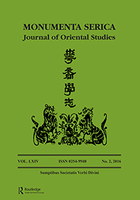
Monumenta Serica-Journal of Oriental Studies
Bridging Cultures with Rigorous Research and InsightMonumenta Serica - Journal of Oriental Studies is a prestigious publication dedicated to advancing knowledge in the fields of cultural studies, history, literature and literary theory, philosophy, and religious studies. Published by Routledge Journals, Taylor & Francis Ltd, this journal boasts an impressive distribution since its inception in 1948, providing a rich repository of scholarly articles that explore the multifaceted dimensions of Oriental studies. Recognized in the Q1 and Q2 quartiles across various categories and exhibiting commendable rankings in Scopus for arts and humanities, the journal continues to serve as a critical platform for researchers, professionals, and students. While it is not open access, the journal maintains high standards of academic rigor and fosters intellectual discourse, ensuring its relevance and impact in an ever-evolving academic landscape. With contributions from leading experts, Monumenta Serica aims to bridge cultural complexities and enhance the understanding of Oriental studies through rigorous research and academic dialogue.
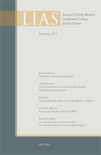
LIAS-Journal of Early Modern Intellectual Culture and its Sources
Unveiling the Rich Tapestry of Intellectual HeritageLIAS - Journal of Early Modern Intellectual Culture and its Sources is a distinguished academic journal that delves into the rich tapestry of intellectual thought from the early modern period, exploring the interplay between culture, philosophy, and literature. Published by PEETERS in Belgium, this journal serves as a vital resource for scholars and students alike, offering a platform for rigorous research and innovative perspectives in the fields of History, Literature, and Philosophy. With an ISSN of 2033-4753 and an E-ISSN of 2033-5016, LIAS has earned notable rankings in the 2023 Scopus classifications, reflecting its commitment to scholarly excellence and its growing influence within these disciplines. Although it currently does not offer open access options, it is esteemed for publishing high-quality articles that illuminate the complexities of early modern intellectual culture and its enduring impact on contemporary thought. The journal's well-curated content holds significance for researchers keen on exploring interdisciplinary approaches and contributes meaningfully to ongoing educational discourse.

Etudes Episteme
Catalyzing Global Discourse on Epistemological IssuesEtudes Episteme is a prominent peer-reviewed journal published by Institut Monde Anglophone, specializing in the interdisciplinary study of epistemology and the philosophy of knowledge. Since its inception in 2002, the journal has embraced an Open Access model, enhancing accessibility and encouraging global discourse among researchers, professionals, and students in the field. With its ISSN 1634-0450, this publication not only contributes significantly to academic scholarship but also serves as an essential resource for understanding the complexities of knowledge production and dissemination. The journal's commitment to high scholarly standards ensures that it remains a vital platform for innovative research and critical analysis, fostering a deeper understanding of epistemological issues in contemporary society. Based in Paris, France, Etudes Episteme invites contributions that challenge the boundaries of conventional thinking and stimulate intellectual engagement across various disciplines.
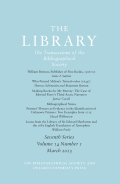
LIBRARY
Fostering Discourse in the Arts and HumanitiesLIBRARY is a prestigious academic journal published by the esteemed Oxford University Press, focusing on the dynamic and evolving field of Library and Information Sciences, as well as broader topics in the Arts and Humanities. With an ISSN of 0024-2160 and an E-ISSN of 1744-8581, this journal has been a key resource since its inception in 1889, offering insights into the importance of libraries in the cultural and educational landscapes. Currently, it holds a Q3 ranking in both Arts and Humanities (miscellaneous) and Library and Information Sciences, illustrating its pivotal role within the academic community, despite its challenges—ranking #396 out of 552 in the Arts and Humanities and #241 out of 280 in Library Sciences as per Scopus data. While not an open-access journal, LIBRARY remains an essential platform for researchers, professionals, and students seeking to explore innovative theoretical and practical approaches in library science, information management, and related fields. With its commitment to fostering discourse and disseminating original research, LIBRARY continues to serve as a vital instrument for knowledge sharing and advancement in the ever-changing landscape of information management.
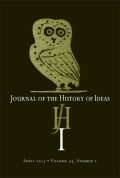
JOURNAL OF THE HISTORY OF IDEAS
Charting the Course of Philosophical DiscourseJournal of the History of Ideas, published by the University of Pennsylvania Press, is a leading academic journal dedicated to the interdisciplinary exploration of philosophical, cultural, and intellectual history. Since its inception in 1970, the journal has provided a vital platform for scholarly discourse, serving an essential role in the study of ideas that have shaped human thought. With an impressive Q2 ranking in Philosophy and a 75th percentile ranking in the Scopus database, this journal reflects its status as a significant contributor to the field. Although it operates under traditional access options, it remains a crucial source of empirical research and theoretical discussions in the humanities. Researchers, professionals, and students alike will find the Journal of the History of Ideas an invaluable resource for understanding the evolving narratives that inform philosophical discourse and cultural practices. The journal's articles, which are rigorously peer-reviewed and available in both print and digital formats, encompass a broad spectrum of topics, ensuring comprehensive coverage of historical thought from various perspectives up to 2024.
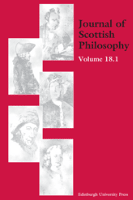
Journal of Scottish Philosophy
Advancing Cultural Discourse through PhilosophyWelcome to the Journal of Scottish Philosophy, a renowned platform for scholarship in the fields of Cultural Studies, History, and Philosophy, published by Edinburgh University Press. With its impactful contributions since 2003, this journal proudly holds a prestigious Q1 ranking in all three categories as of 2023, reflecting its commitment to advancing critical discussions in Scottish philosophical thought and its broader cultural contexts. The journal engages a diverse readership by providing rigorously peer-reviewed research, innovative insights, and theoretical advancements that explore the rich tapestry of Scotland's intellectual heritage. Without the restrictions of open access, the journal remains a pivotal resource for researchers, professionals, and students eager to delve into the complexities of Scottish philosophy, fostering a vibrant dialogue across disciplines. Interested authors can contribute their manuscripts to join the distinguished ranks of works featured in this esteemed publication.

Ingenium-Revista Electronica de Pensamiento Moderno y Metodologia en Historia de la Ideas
Enriching Understanding of Ideas Across Disciplines.Ingenium - Revista Electronica de Pensamiento Moderno y Metodologia en Historia de la Ideas is a pivotal academic journal dedicated to the exploration and analysis of modern thought and methodological frameworks in the history of ideas. Published by the esteemed Universidad Complutense de Madrid, this journal serves as a vital platform for scholars interested in interdisciplinary studies that merge philosophy, history, and social sciences. With an ISSN of 1989-3663, Ingenium stands at the forefront of academic discourse, encouraging the dissemination of knowledge without barriers through its Open Access principles. By fostering a rigorous academic environment, Ingenium aims to enrich the scholarly community's understanding of the evolution of ideas and their impact on contemporary thought. As such, it is an essential resource for researchers, professionals, and students striving to navigate the complexities of modern intellectual landscapes.
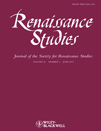
Renaissance Studies
Exploring the Depths of Renaissance ThoughtRenaissance Studies, published by Wiley, stands as a vital academic platform within the disciplines of Cultural Studies, History, Literature and Literary Theory, Religious Studies, and Visual Arts and Performing Arts. With an impressive history of publication spanning from 1987 to 2024, this journal is recognized in 2023 metrics as a Q2 journal in four categories and Q1 in Literature and Literary Theory, reflecting its substantial impact in promoting interdisciplinary dialogue and research. The journal's robust Scopus rankings further underscore its relevance, including a position in the 83rd percentile in Literature and Literary Theory. Although not an open-access journal, it provides readers and contributors with access to curated, high-quality scholarship that explores the complexities of the Renaissance and its enduring influence on contemporary thought and culture. Researchers, professionals, and students alike will find Renaissance Studies invaluable in fostering discussions that bridge historical context with modern inquiry.